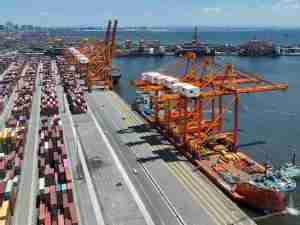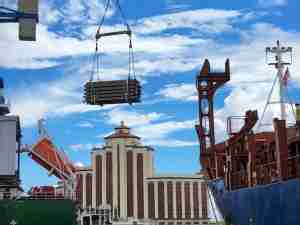Iran has been shopping for wheat at a frantic pace, ordering a large part of its expected yearly requirement in a little over one month and paying a premium in non-dollar currencies to work around toughened Western sanctions and avoid social unrest.
Food shipments are not targeted under western sanctions aimed at Iran's disputed nuclear programme, but financial measures have frozen Iranian firms out of much of the global banking system.
Since the new year, some vessels had turned away from Iran without unloading after Iranian buyers were hit by a trade finance squeeze, but data appears to show that shipments are now arriving successfully.
In an effort to blunt the impact of the sanctions, Iran has even begun buying wheat from its enemy - the United States.
The sanctions make it difficult to obtain letters of credit or conduct international transfers of funds through banks.
So instead, Iran has embarked on an ambitious buying spree, purchasing around 2 million tonnes of wheat since February at a premium to international market prices in currencies including Japanese yen and Russian roubles.
"There is no doubt in my mind it is geopolitical hedging. They are trying to get as much (wheat) as they can in the country to blunt the effect of any further escalation in international sanctions," Rabobank commodities analyst Nick Higgins said.
"I think they hit the market hard and early and that from their perspective limited the chances that anyone could react to such large purchases," he added.
AIS ship tracking data on Reuters showed 10 dry bulk vessels were anchored outside Bandar Imam Khomeini, one of Iran's largest grain terminals.
At least six of the vessels were larger ships known as panamaxes, which can carry around 60,000 tons of grains.
A further panamax vessel, which had been anchored at the port this week, was now heading to India and was likely to have discharged a cargo already, AIS data showed. A smaller bulker vessel was also heading away from Iran to Singapore after being anchored near the terminal this week.
Massive Stockpiling
Iran is close to self-sufficient in wheat most years, but needs to import when the harvest is weak, as it is expected to be this year.
German commodity analysts FO Licht forecast Iran will need about 3 million tonnes this buying season, which runs from July 2011 - June 2012. There are signs Iran's purchases will be far greater to shield it from the possibility of future shortages.
It bought around 2 million tonnes just last month from Russia, Germany, Canada, Brazil and Australia.
Sanctions are worsening an economic crisis which has caused rising prices, shortages of some goods and a collapse of the local currency at a time when other countries in the Middle East are experiencing political and social unrest.
"If left unchecked, significant hikes in food and basic commodity prices on the ground are likely to be a key source of social unrest," said Rory Lamrock, intelligence analyst with security firm AKE.
"The Iranian government's reported payment is telling of its continued ability to mitigate against finance freezes despite increased sanctions aimed at nuclear proliferation."
While U.S. President Barack Obama aims to squeeze Iran's oil trade and not impoverish its population, evidence is mounting that the measures are hitting the economy more broadly.
On March 1 it was revealed Iran had made a rare purchase of 120,000 tonnes of U.S. wheat. It is also aiming to import 1 million tonnes of wheat from Pakistan in a barter deal.
Payment problems resulting from sanctions halted some deliveries to private Iranian buyers since the start of this year. Ten vessels turned away from Iran to new destinations including Yemen, the United Arab Emirates and Egypt, incurring big losses. The last of them sailed away










